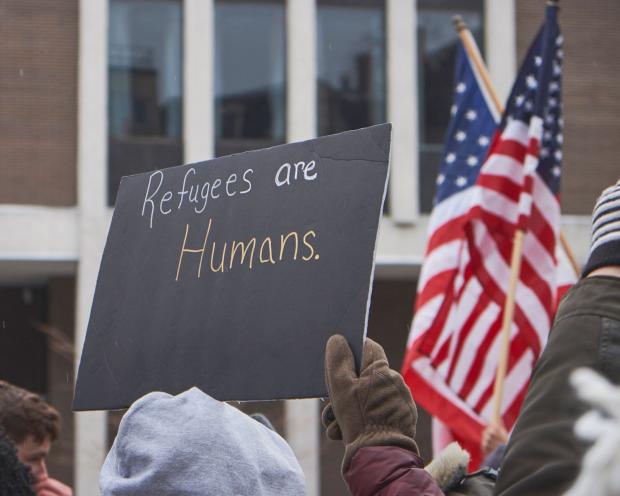Letter: Welcome the Immigrant, but Also Welcome the Refugee
We are approaching the end of the first month of President Trump’s travel ban, an executive order barring entry into the United States for nationals of seven majority-Muslim countries. As a member of an ethnic group that had been subjected to immigration restrictions in the past, I have been heartened by the quick and sustained defiance to this injustice.
The anti-Trump protests that erupted at the airports detaining travelers from the affected countries were swift. Several federal judges have since blocked enforcement of the ban. The media has generated numerous human interest stories about those most directly affected by it.
These stories put a heart-warming name and face on the detainees, deportees, and strandees. Each individual profiled is afforded the dignity of a narrative that separates him or her from an undefined mass. Yet, these human interest stories overwhelmingly featured students and immigrants, mostly those working in medicine and technology who are young and successful. In line with these patterns, mega-corporations such as Google, Facebook, and Apple have expressed concern that the ban would negatively impact their industries because they rely on workers from those countries.
More difficult to embrace are the stories of refugees who collaborated with our armed forces in a globally denounced war. Often, I have to consult niche news sources geared toward military personnel in order to find them.
Hameed Khalid Darweesh became a cause célèbre when he was detained in handcuffs at JFK for 17 hours immediately after the ban went into effect. Yet, his involvement in the Iraq War was downplayed. The New York Times, for instance, delicately referred to him as an “interpreter who worked…on behalf of the United States government in Iraq.” Articles about refugees that cast them in the humanizing light often reserved for students and immigrants are not common.
The consequences of being forced to remain in one’s country of origin are much more dire for refugees than for immigrants. A student or immigrant unable to resume their studies or practice because of the travel ban will face professional repercussions. This is no small matter. However, the refugee targeted because of their collusion with our country’s military risks imprisonment, torture, and death.
It’s easy to celebrate students and immigrants. Their presence in our country—to pursue a better education or career—affirms our belief in the United States as a beacon for the less fortunate. However, the refugee reminds us of our atrocities abroad.
In a previous generation, the Hart-Celler Act (1965) abolished immigration quotas based on national origin. (Incidentally, Trump’s executive order violates it.) It allowed people from countries barred by previous legislation to enter the United States. Among those were immigrants from East Asia and South Asia who worked in medicine, technology, and other fields actively recruited by US industries.
My mother, who emigrated from Taiwan, took advantage of this law to practice pharmacology in the United States. Shortly after she arrived, her boyfriend, who eventually became her husband, accompanied her to begin his medical residency. “In most families like ours,” my mother told me proudly, “the man comes first, and the woman follows.” She implored me never to forget that she set out on her own, and only later did my father join her.
The tenor of Asian migration changed in the decade after the Hart-Celler Act when refugees from the Vietnam War began to arrive. A large number were veterans who had fought alongside the United States. Not all of them made it here to safety.
As a child, I heard repeated warnings never to leave the house unless I was impeccably dressed. These went hand-in-hand with admonitions for hanging out with friends in public—loitering while watching the life of the street pass by, as youth are wont to do. “People will think you are a Vietnamese refugee,” my mother said. It didn’t matter that the nearest Vietnamese enclave was miles away from our middle-class town (in another state, in fact).
It was easier for Americans to tolerate Asian immigrants. They were model minorities who provided evidence of the American Dream’s success. Conversely, Southeast Asian refugees were an inconvenient reminder of our participation in a morally bankrupt war.
We need to protect the rights of immigrants and students whose travel is threatened by Trump’s ban. However, we can’t do it while tiptoeing around the circumstances that have led refugees here. We can’t do it by turning our eyes away from our collusion in a global crisis. Let’s remember to confront and sit with the discomfort that refugees instill. We must welcome our immigrants, and we must extend that same hospitality to our refugees.
Cynthia Wu is an associate professor of Transnational Studies at the University at Buffalo.

